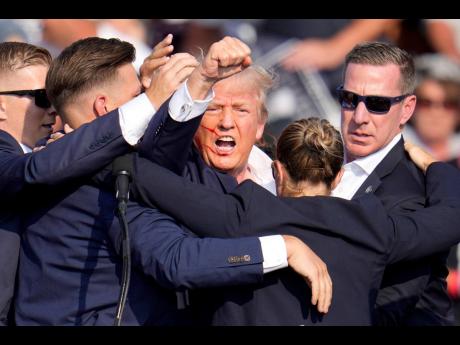Editorial | America’s fragile democracy
Saturday’s assassination attempt on Donald Trump must be unequivocally condemned. It was an attack on democracy in the United States and elsewhere.
Yet, the act by 20-year-old Thomas Matthew Crooks in Bethel Park, Pennsylvania, was emblematic of the divisiveness and toxicity in US politics that Mr Trump has exploited and fanned, first to gain the American presidency, and now in an attempt to return to the job. It is to be recalled that Mr Trump launched his political career with a racist dog whistle about the authenticity of the US citizenship of the country’s first black president, Barack Obama.
In office, Mr Trump not only kept that whistle between his lips, but systematically undermined America’s institutions of democracy, up to the point of orchestrating an insurrection in a vain bid to stay in power.
HOBSON’S CHOICE
Apart from the big questions of how the United States now sustains its democracy, faced with the Hobson’s choice of two differently flawed candidates in November’s presidential election, hopefully Saturday’s incident will ignite, finally, a rational debate on the easy availability of guns in America.
Having become a victim of gun violence, Mr Trump might be less inclined to an unmindful bullishness on gun ownership, in attempting to satisfy his base.
Little is known about Mr Crooks, or what inspired him to attempt to kill Donald Trump, the putative Republican Party nominee for president, in an attack at an election rally that cost at least two lives, including Mr Crooks’.
It is nonetheless safe to presume that he channelled the feelings of millions of Americans, and many more people around the world, who believe that a second Trump presidency holds an existential threat to US democracy and global stability.
This concern has been exacerbated by the emotiveness, and general absence of deep thoughtfulness in America’s political discourse, especially by Mr Trump and his captured Republican Party. They have ensconced themselves in an ethnocentric and illiberal ideology, under the banner of Make America Great Again (MAGA).
It is in the context of the MAGA ideology that Mr Trump once referred to states with people like Jamaicans as “sh** countries” and pined for emigrations from places like the Nordic region, rather than Latin America, the Caribbean and Arab Middle East nations.
REJECT LOSS
It is this ideology, too, and Mr Trump’s authoritarian impulses that caused him to reject his loss in the 2020 presidential election and to gee up crowds to attack the US Capitol to prevent the certification of Joe Biden’s victory.
But as Mr Biden (himself facing questions about his physical and cognitive fitness for a second term in office) said of the assassination attempt against Mr Trump, that there ought be “no place in America for this kind of violence”.
“It’s sick. It’s sick,” Mr Biden said.
This newspaper would add, or any country. That, unfortunately, is not the case.
The United States is not unaccustomed to the assassination or attempted assassination of presidents, or the injuring of members of Congress in such attempts. Abraham Lincoln, John F. Kennedy, Ronald Regan, Robert Kennedy and others are testament to this.
Abroad, only in May, Slovakia’s populist Prime Minister Robert Fico survived an assassination attempt, after he was shot in the stomach by a disgruntled 71-year-old former security guard and poet.
Even in perceived staid Britain, politicians have not been immune from violence. In 2016, the Labour MP, Jo Cox, was stabbed to death while out greeting constituents; and five years later, a long-standing Tory parliamentarian, Sir David Amess was stabbed and killed in his constituency office.
While Jamaica has had few direct assaults against a top political leader, the country has in the past endured more than its fair share of political violence, especially in 1980 when hundreds were killed, including Roy McGann, a junior minister and parliamentary election candidate.
ABIDING COMMON RULES
The workability of democratic politics, as the Jamaican intellectual Rex Nettleford used to say, is of each player agreeing to the same game, abiding by common rules. One side cannot kick the ball while the other attempts to run with it in hand. Which is what, largely, has become the norm of America’s politics.
On that score, Mr Biden was right in his statement that the assassination attempt against Mr Trump was one example of the reason “ why we have to unite this country”.
That, however, will not happen by presidential decree. It has to be the result of political parties and political leaders having a shared vision of the United States, even when they disagree on strategy and tactics.
In the short term, preventing the United States from descending into tit-for-tat violence, or the placing of further stress on its institutions, will depend on how the country’s leadership, especially the Republicans, responds to the shooting.
Declaration of “fight”, which came from Mr Trump, hopefully only as a reflex in the heat of the moment, and the more extremist blaming of President Biden and the Democrats, as have other Republicans, will not help.
The Democrats, too, may be required to dial back their rhetoric for the time being. Perhaps they might have to find new language, without sacrificing clarity, to define why they believe Donald Trump is bad for America.
Put mildly, the Americans are in need of an honest conversation about the state of their country and its democracy, but without the angst.

